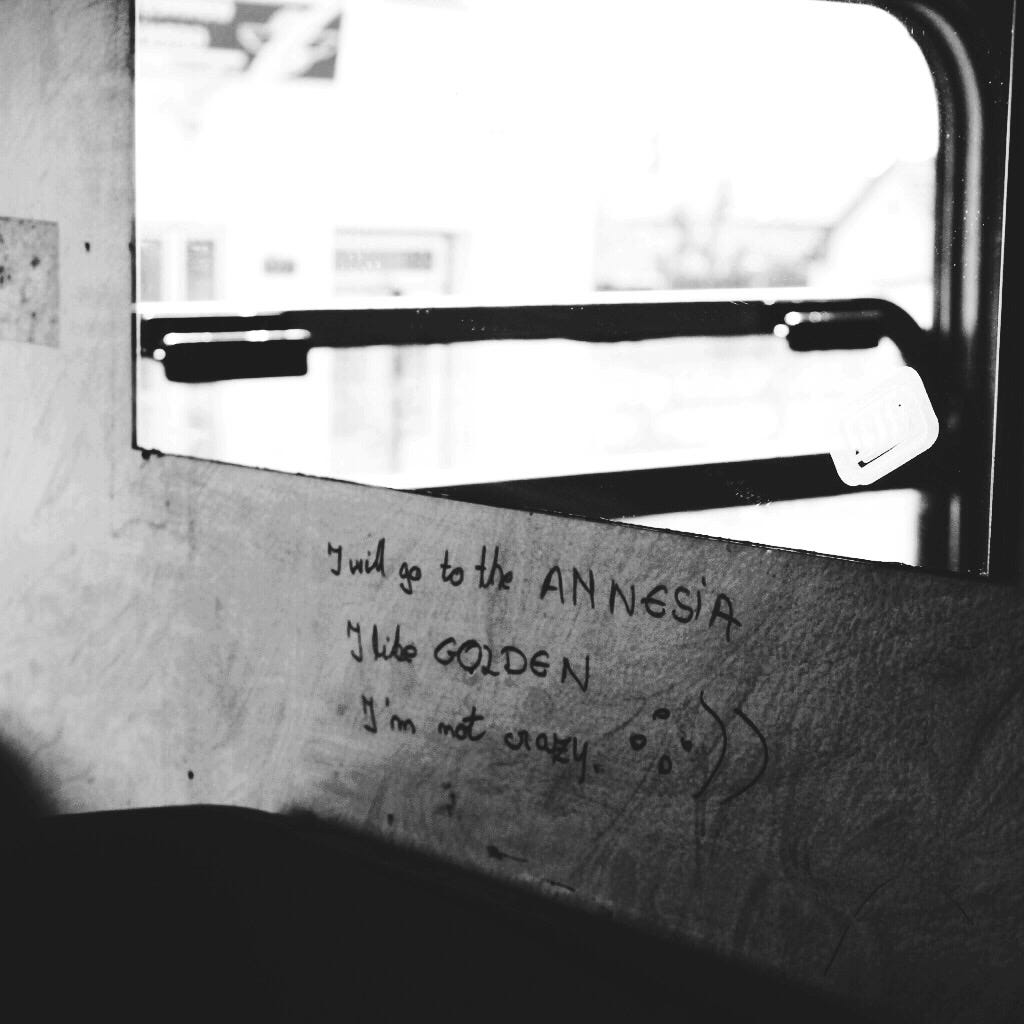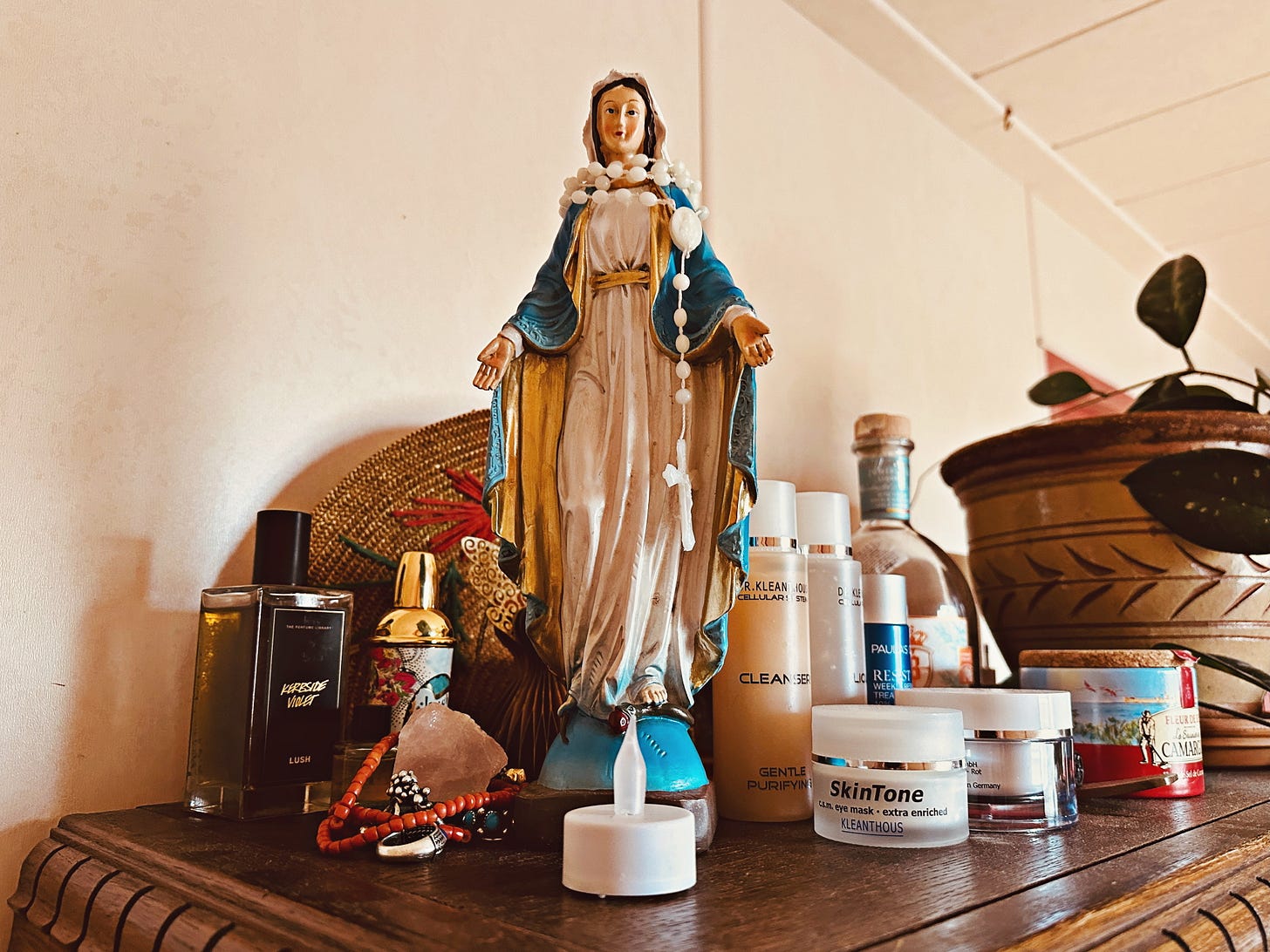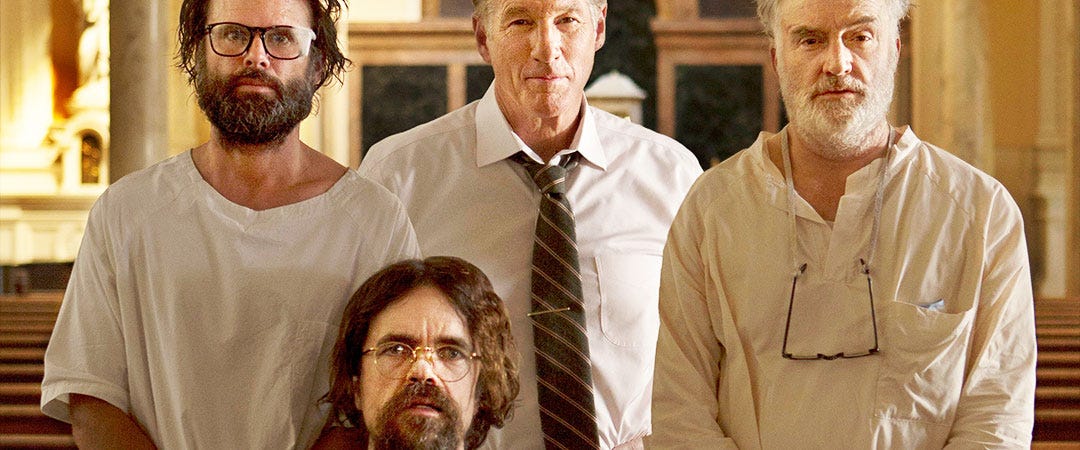Insane Or Enlightened?
Am I having a spiritual awakening or am I loosing my mind?
From the moment I became aware of “something” being wrong with my health in March 2011,up to the present day, I have had experiences which I cannot logically explain. From premonitions in a dream to being fully awake in a state of pure bliss, from dropping out of time to falling into the universe, my perspective shifted profoundly. Was I experiencing a spiritual awakening or simply losing my mind?
What even is “spirituality” or an “awakening”?
When I hear spiritual thinkers, guides or leaders talk about it, the starting point usually is: “Humanity is asleep.” No, we are not sleepwalking zombies. But we are not exactly awake either. Not fully awake to potential or possibility, not awake to who we are, or what we are made of (more energy than matter). When we are not connected with our real selves, or true nature, our personality constructs jump in to fill the void.
More questions: What is my true self? What is my true nature? How do I know?
Spirituality when defined as “the recognition of a feeling, sense it belief that there is something greater than myself, something more to being human than sensory experience, and that the greater whole of which we are part is cosmic or divine in nature” sees the self that is experiencing the spiritual, as part of a bigger whole. The experience is the connection, the knowing, the being part of this whole.
A spiritual awakening isn’t a moment. It is also not a static, permanent state of being achieved by flicking a magic switch. It is a lifelong (and maybe even beyond) process of endless enlightenment. We keep walking on the never ending road towards ourselves, where the dot on the horizon simply keeps moving. It is not a destination to arrive at.
But does this awakening, awareness of self, always require the presence or actions of an “external divine or cosmic entity or power”? Or can answers be found within?
The last part is where it gets tricky: who or what is Cosmic and/or Divine? And is that a condition of “spirituality” as I experience it?
WHAT IS GOD?
I think I have experienced myself looking at the world without filters, lenses, or conditioning. I know what it is like to embody a pure, happy, generous, genuine compassionate being-ness, and it happened in moments of extreme suffering where I felt pushed to a breaking point. Instead of breaking I became a “personless” presence, I felt a fullness, a brilliance and peace. I surrendered.
Liberation not defeat. I know that. How I relate to a higher power, I am still exploring.
I consider myself agnostic. Born and raised within a Catholic tradition, it resonates with me probably mostly based on familiarity. It is my grandmother watching the Urbi et Orbi, it is the cross my grandfather gently dabbed on my forehead to keep me safe while sleeping. I just bought a statue of Mary yesterday and hung the rosary a friend gave me around her neck. It dangled from my rear view mirror for over 2000 miles. And it kept me safe. It also glows in the dark, which is neat.
I entertain a rather abstract God concept, and when I talk about God, faith, spirituality and soul I will never assume I mean the exact same thing as you do. I will always have to ask questions, and answer yours. It is a dynamic process, as much of a dialogue as it is an inner monologue, which I expect will take a lifetime to evolve.
DON’T WORRY
I have already shared this in the memoir I wrote and self published in 2015. Before that I had only talked about it openly with a few close friends and relatives. My tribe seemed almost completely atheist which made me sometimes hesitant to go into details. Believing in something like God is considered unintelligent. Daft. Insane. It comes very close to the way Ricky Gervais and Stephen Fry talk about, and dismiss, God, which I will reserve for another conversation to be had another time.
I did eventually write it down, and talked about it more in-depth over the years. There were several instances surrounding my cancer experience that caused me to question not my sanity (others did), but challenged my belief.
Premonition in my dream: a few months before I was diagnosed I had a nightmare. I had excruciating abdominal pains. I broke out into a sweat and started shaking. A group of white semi-transparent, virtually formless, beings floated and hovered above my body. “Don’t worry, we will take it out.” they said.
Premonition in broad daylight: An hour after having tissue removed from my cervix and being reassured by the gynaecologist it was nothing to worry about, an image formed in my mind. It said the opposite: “I will experience what it is like to have cancer.” It literally phrased it like that. Not “I have cancer.”
Post surgery longing to go home, I told everyone at the hospital that I had to take it off (my body) and that I had to go home home (heaven or wherever it is souls originate from). Nursing staff found this alarming. Psych ward was notified and on standby.
In the middle of a lymphatic infection: During a fever dream, the entire healing journey as described by Brandon Bays unfolded. This was the only experience extending beyond myself and involving others.
The spontaneous remission: After three months of daily meditating with Deepak Chopra my check up scan showed no abnormalities. For the first time since the diagnosis, my remaining lymph nodes in my groin were within normal range.
A GREATER CONTEXT OF THE PSYCHOTIC AND THE SACRED
Years, maybe even decades ago, I had a conversation I with a childhood friend. She was a social worker who specialized in helping people with a dual diagnosis. During one of her studies she had learned that the area of the brain that is activated during a psychosis is the same area that lights up in people’s s ist nor a neurologist, but it sounded plausible. My friend saw everything as one and the same. To her there was no difference between spiritual awakening and psychosis.
The reason for this topic to be raised at that particular time, was that a mutual friend of ours had experienced a psychotic episode after the tragic loss of her mother. Our friend had been raised within a rather strict religious family, something she had always struggled with. Somewhere in her process of grief, her brain decided to protect herself against a loss too great to process, and a feeling of having no control to great to bear, that it gave her control back in a mission. Her mind told her that if she were to convert 40 people in 40 days then the world would be ok.
This is the interpretation my social worker friend gave to this chain of events, where our mutual friend ended up being temporarily committed to a psychiatric hospital. Even though we remained friends after, I never raised any questions. I regret that now.
“The basis for considering spiritual experiences as either a neurotic defense or an artifact of brain activity is the belief that any experience that differs radically from normal perceptions is, by definition, abnormal.” -Bruce Greyson
The Western medicine approach does not allow space for the sacred, the transcendental, said Gabor Mate to Alex Howard in a conversation on trauma, healing, psychology and spirituality.*
It allows for the cognitive and the chemical, the logical and reasonable. My epsiode post surgery could not be explained away within that context. So, I must have been nuts. But I did not need a psychiatrist or anti-psychotic medicine. I needed a hot cup of tea and a good conversation. And I needed something for the pain.
The first two were provided by dad, who had been sitting next to my bed doing Sudoku puzzles, while I was lying there like a broken record, repeating myself. The latter came the next day, when the doctors finally believed me when I said I felt all the pain. The epidural was in the wrong place. Once a new line of morphine was sorted out, I was no longer threatening to leave my body.
Was my brain protecting myself, by envisioning some holy escape from the hell of pain my body was in? I don’t know. If it had been just that single experience, than maybe I would be more inclined to put it down to just that.
The three christs of Ypsilanti (2017)
I HAVE BEEN TALKING TO JESUS
It is not uncommon for psychotic episodes to have a religious theme.
During the first period after my release from hospital back in 2011, one evening I was talking to a cousin. She worked in a psychiatric facility. Half joking she mentioned having discussed my terminal cancer status with two of her clients there: “I asked them to put in a good word for you. This is as high up in the chain as we can get.” She was only half joking. It sounds like the script of “Three Christs”, but the reason she talked to them was that they both believed to be the reincarnation of Jesus Christ.
There are many cultures where symptoms that in the West are interpreted as an indication of severe mental health issues, are seen as a person’s ability to experience and communicate with other realms. You would first have to acknowledge such other realms exist. The Dutch documentary maker Sunny explored this in the three-part documentary series “The Sunny Side of Spirit”, where in Brasil for example a psychiatrist at a local hospital is also a medium, and where one of the Candomble healers is also a clinical psychologist. Here, there is no separation between the sacred and the psychotic.
In "Differentiating Spiritual and Psychotic Experiences: Sometimes a Cigar Is Just a Cigar", Bruce Greyson, M.D. (University of Virginia) explores the overlap and distinction between spiritual experiences and psychotic episodes. He acknowledges that both can involve altered states of consciousness, perceptual anomalies, and a sense of connection to something greater. However, he emphasizes that context, impact, and integration are key factors in differentiating the two.
Greyson outlines several characteristics that both mystical and psychotic states can share:
Altered perceptions (hallucinations, visions, auditory phenomena)
Time distortion (feeling timelessness, living in an eternal present)
Ego dissolution (loss of self-boundaries, feeling merged with a greater reality)
A sense of revelation (receiving profound truths or insights)
Connection with otherworldly beings (angels, spirits, deities, or unseen presences)
Because of these shared features, spiritual experiences are often misinterpreted as psychosis, and vice versa.
Greyson argues that the most critical differences between the two are in their effects on a person’s well-being and ability to function. For example, a person having a mystical vision might emerge with a renewed sense of purpose and peace, whereas someone experiencing a psychotic hallucination might feel confused, paranoid, and disconnected.
When I put these questions forward to my own therapist, he tended to agree: A lot depends on the meaning the experience holds for the person themselves, nd how they can positively integrate this into their lives. Greyson argues that how we interpret these experiences matters—whether they are seen as insights or symptoms can shape a person’s integration of them.
Western psychiatry’s strict medical model can sometimes pathologize genuine spiritual awakenings, leading to unnecessary treatment (e.g., hospitalization, medication). Greyson warns against mislabeling mystical experiences as psychotic simply because they involve non-ordinary states of consciousness. Instead, he advocates for a more nuanced approach—one that considers context, emotional impact, and personal integration before jumping to psychiatric conclusions.
The article’s title refers to Sigmund Freud’s famous quote, suggesting that sometimes an experience is just what it appears to be—nothing more, nothing less. Not every spiritual moment indicates psychosis, and not every hallucination can be seen as a mystical insight.
Greyson encourages a both/and approach rather than an either/or binary:
A person might have a spiritual experience that includes intense psychological challenges.
Someone struggling with mental illness might also have profound spiritual insights.
Instead of dismissing one side, both science and spirituality should be considered when interpreting these experiences.
More questions remain: Who is really equipped to call out the difference when a priest may have no experience in psychology or psycho-pathologie and vice versa a clinical psychologist may know nothing about the sacred, mystical or spiritual?
WHAT DO I BELIEVE?
Were my own experiences grounding and meaningful (spiritual) or disorienting and distressing (psychotic)? For me they were essential to my process of coming to terms with my mortality, with a terminal diagnosis. They helped me through the pain, both physichal and mental. For the people around me, my experiences were often cause for concern about my mental health.
If “my tribe” had been more open to spirituality, would I have framed your experiences differently? I have a handful of friends who are religious. I also have friends and family members who would likely call themselves spiritual.
My mother is not one of those, which is why she surprised me more than anyone else. A few days after the Brandon Bays dream, I hesitantly told my mother. Instead of frowning or waving it off, she asked questions. She wanted to know exactly when this dream had taken place.
Just before I fell asleep and I had already felt the first few stages of the healing journey unfolding, and I had whispered: “I do not want to do this alone.” It turned out, taht exactly at that moment my mother had been lying in bed, restlessly. Her mother, my grandmother, appeared to her in her dream, and instructed her to put her hand on the right side of her groin. The exact spot where my lymph nodes were on fire with inflammation. “Your daughter needs you. Just lie still. There is nothing you have to do. Just be present.”
We have since “played around” with our psychic connection. I once even managed to send her a shopping request, by simply chanting yoghurt while she was in a supermarket 14 kilometres away. She stopped by on her way home to drop it off.
The idea that “God just IS” aligns with how some neuroscientists describe non-dual awareness—could this be both a brain function and a genuine spiritual reality?
I have to trust my instinct to question simplistic diagnoses and honour the complexity of my experiences. It is why I felt lucky to have found Gresyon’s work. He does not reject psychiatry or spirituality but suggests a middle path—one where science and the sacred can coexist.
"Spiritually transformative experiences, unlike most forms of mental illness, may enhance serenity and sense of purpose and expand the experiencer's perception and appreciation of the world." - Bruce Greyson
How do I feel about these experiences now? Does their impact, meaning and value change in light of a possible cancer recurrence? I made it a habit to meditate, to talk to my body, to talk to God. But I received no warning this time. No dreams, no flashes, nothing.
These are questions I am still left with:
The idea that premonitions might be an inner voice, the body speaking in a language I hadn't yet learned. Is this what is meant with the mind / body connection? I will have to explore more how intuition, subconscious processing, and embodied knowledge might manifest as “messages.”
The telepathic-like experiences—how do they fit within my understanding of connection, consciousness, and reality? Are they glitches in the matrix, or is the matrix simply more fluid than we assume?
The concept of oneness, a totality that just is rather than a mystical or external force, leaving out the divine and cosmic, is that enough for me?
Maybe faith, belief, with or without a religious context, is the most powerful placebo we have. Or maybe, there is just simply more, way more than meets the eye…
PS As I am about to go for a deep dive into the archives of my former death doula, who has graciously offered to host me for a few weeks, I write this with various perspectives in mind. I aim to view health and well being, our being, as holistically as possible. That means no binary focus, no judgments, no conclusions and no “either or”. We have a great body of work at our disposal in the field of psychology and neuroscience that does not deserve to be ditched in favour of an “almighty spirit”. I also don’t think it is worth applying science and rational thinking to proove experiences outside of that sphere to be null and void. But: What is what when it comes to mind, matter and more?
*For future reference: I will dive deeper into the work of Gabor Mate, Hameed Ali, Bessel van der Kolk and other who address a holistic approach to healing, and what role spiriuality plays in trauma healing, finding meaning and purposeful living.





